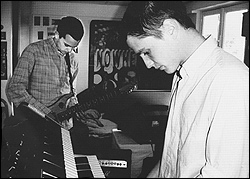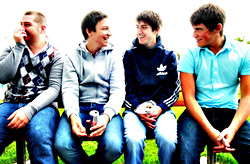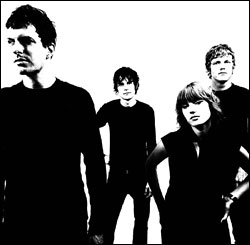The ’60s killed instrumental rock. Political upheaval, the British Invasion, and the rise of psychedelia delivered a triple deathblow to the nascent genre when it was barely old enough to cross the street on its own, at least without a hot rod, a surfboard, or, in the case of the Ventures’ “Telstar,” a satellite for assistance. With its matching outfits, two-minute songs, and generally insufferable wholesomeness, the approach was simply too prim, too unambitious, and nowhere near relevant or charismatic enough to make a place for itself in that rumbustious decade or its hedonistic successor. Only in the ’80s did the makers of vocal-free rock surface again, but its proponents— Durutti Column, Love Tractor, Pell Mell, and the like—might as well have been baby geckos in a herd of mastodons. It took the blossoming of hip-hop, house, techno, drum and bass, world music, and “post-rock” (read: rock that didn’t) to reorient the listening public and bring the mostly instrumental cadenced critter back to life. (The worldwide weed explosion didn’t hurt, either.)
The beast has changed. M83 fall under the rock rubric primarily because they employ big guitars and fairly straightforward beats. The French duo’s second album, Dead Cities, Red Seas, and Lost Ghosts, released earlier this year on Mute, steals heavily from the Mogwai/Kinski playbook: oceanic textures and extreme dynamics fuel the album’s (mostly) extended compositions, along with a debt to Loveless-era My Bloody Valentine. But M83 use precisely cantilevered keyboard washes to fill many of the harmonic holes their antecedents plug(ged) with feedback and ghost tones. They also sound a lot prettier, with a buoyant sensuality that practically demands a place in Viagra ads and soft-core porn. If ever Virgin Suicides II: The Deflowering sees the light of day, Air’ll have to arm wrestle ’em for the soundtrack gig.
M83’s only real shortcoming is a tendency to wax a little too angelic for too long, to the extent that your ears feel like wings and you just flew in from New York with them. “Beauties Can Die” opens with a massive tumescence of guitar, synth, and ethereal female vocals (like many of their peers, the duo utilize the occasional voice), then spends the better part of 15 minutes ebbing away in the musical equivalent of a Merchant-Ivory sunset. Are they programming a trail of clothes to the bedroom? A popcorn break? No matter: The song’s all-but-inevitable concluding swell is an incontrovertible case of too little, too lite. Far more compelling (and commensurately less time devouring) is “Noise,” a gloriously hammering, distortion-laced harmonic conflagration with enough brute centrifugal force to propel the track toward the twosome’s namesake spiral nebula in style.
You could mix out of pretty much anyplace on Dead Cities into “Gone Forever,” the opening track from Ulrich Schnauss’ A Strangely Isolated Place (Domino), with only the sharpest ears in the galaxy noticing the change. Like M83, Schnauss marries guitar and electronics in a highly melodious manner and cites MBV as a primary source of inspiration. But the Berlin-based turncoat drum and bass producer’s heart really belongs to ’90s shoegazers Slowdive. Schnauss curious attachment renders “Gone,” along with much of his second album, considerably less lubricious than most of Dead Cities, but every bit as sweet and no less eligible for soundtrack status: If Alan Alda and Snoopy ever make a holiday special together, the song would be perfect for its hot-air balloon interlude. The mildly funky “Clear Day” makes for even likelier licensing fodder, especially in the event that America sends the Sta-Puf Man to Mars and someone makes a documentary about it. Place works best when Schnauss stops rewriting Pachelbel’s Canon and soaks his candy floss in a little peppermint schnapps. “On My Own” rolls like a marriage of early Stereolab with Here Come the Warm Jets–era Brian Eno, complete with undulating bass throb, backward synth, and throaty Plutonian guitar so heavily processed that it’s easy to mistake for keyboards at first.
Mono don’t spare the effects, either. While the Japanese quartet’s Steve Albini–produced, newly released third album, Walking Cloud and Deep Red Sky, Flag Fluttered and the Sun Shined (Temporary Residence Ltd.), skews far closer to the work of 21st-century instrumentica avatars Mogwai and Godspeed! You Black Emperor, they share much with their French and German cousins in lushness (including a manifest admiration for the work of Kevin Shields’ former band). The most prominent common trait is the generous helping of expansive guitars, filling in handily for both keyboards and themselves in Mono’s case. And drummer Yasunori Takada’s sinew-powered beats are remarkably similar to Schnauss’ and M83’s machine creations.
Much of what distinguishes Mono is simple person power. Takada, bassist Tamaki, and guitarists Takaakira Goto and Yoda (!) outnumber both other projects combined, and the additional muscle makes for greater intensity when the frequent crescendos peak. The chorded, slash-and-burn guitar melodies of “A Thousand Paper Cranes” offer as much tonal density as half a dozen one-man overdubs. Mono have also toured far more extensively than their bedroom-studio-based compatriots; countless live shows have imbued the band with a level of confidence that shines through on Walking Cloud like water in moonlight. Not to suggest that the other two projects are lightweights, by any means. All three albums bear witness to a depth of conviction—and composition—that makes most of their predecessors in the instrumental rock game seem like helium. Still, there’s much to be said for Mono’s labor-intensive approach, especially onstage. Unless they’re hauling loads of gear or extra players, it’s hard to imagine M83 or Schnauss getting by without laptops: the least visually compelling live instruments since the triangle. They’ve made their musical beds; now they just need to find a few extra folks to jump around on them.
M83 and Ulrich Schnauss play Neumo’s at 8 p.m. Sun., Sept. 19. $12 adv./$14.








